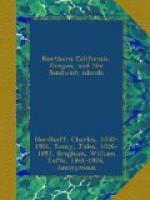He had long sheds as shelter for his ewes about lambing-time, so as to protect them against fierce winds and cold rain storms; and he saved every year about two hundred tons of hay, cut from the wild pastures, to feed in case the rain should hold off uncommonly late. His aim was to keep the sheep always in good condition, so that there should never be any weak place in the wool. His sheds cost him about one dollar per running foot. The sheep found their own way to them.
I find it is the habit of the forehanded sheep-grazers in the Sacramento Valley to own a range in the foot-hills and another on the bottom-lands. During the summer the sheep are kept in the bottoms, which are then dry and full of rich grasses; in the fall and winter they are taken to the uplands, and there they lamb, and are shorn. Where the range lies too far away from any river, they drive the sheep in May into the mountains, where they have green grass all summer; and about Red Bluff I saw a curious sight—cattle and horses wandering, singly or in small groups, of their own motion, to the mountains, and actually crossing the Sacramento without driving; and I was told that in the fall they would return, each to its master’s rancho. I am satisfied that, except, perhaps, for the region north of Redding, where the winters are cold and the summers have rain and green grass, and where long-wooled sheep will do well, the merino is the sheep for this State; and “the finer the better,” say the best sheep men. Near Red Bluff I saw some fine Cotswolds, and in the coast valleys north of San Francisco these and Leicesters, I am told, do well.
A great deal of the land which is now used for sheep will, in the next five, or at most ten years, be plowed and cropped. There is a tendency to tax all land at its real value; and, except with good management, it will not pay to keep sheep on land fit for grain and taxed as grain land, which a great deal of the grazing land is. As the State becomes more populous, the flocks will become smaller, and the wool will improve in quality at the same time.
I have seen a good deal of alfalfa in the Sacramento Valley, but I have seen also that the sheep men do not trust to it entirely. They believe that it will be better for sheep as hay than as green food; and this lucerne grows so rankly, and has, unless it is frequently cut, so much woody stalk, that I believe this also. It makes extremely nice hay.
Every man who comes to California to farm ought to keep some sheep; and he can keep them more easily and cheaply here than anywhere in the East.




